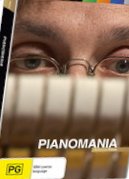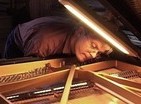Steve Garden | | 4 min read
Diedre Irons (piano), Martin Riseley (violin): Le Rossingnol; Andante Notturno

You would be forgiven for thinking that a film about piano tuning would be enough to test the stamina of even the most hardened cinephile, but despite the rarefied world in which Pianomania is set, the film is far from minimalist.
Robert Cibis and Lilian Franck’s fine documentary about master piano technician Stefan Knupfer is one of the most lucid and engaging of documentaries, a film that manages (with seeming effortlessness) to take the viewer remarkably close to the esoteric heart of the creative impulse.
Pianomania (on Madman DVD) first screened in New Zealand at the 2010 Auckland International Film Festival.
Alas, the film had to suffer the ignominy of the unforgiving Academy Theatre sound system, where every second note was battered into distorted submission. It was a sad state of affairs for such a concentrated film on the subtle and very exacting business of searching for the perfect sound.
Thankfully, the Madman DVD release allows us to fully appreciate Stefan Knupfer’s inspirational quest for sonic perfection, particularly if played through a good sound system, where one might catch glimpses of the ultra-specialised nuances that he and the musicians he serves painstakingly strive to articulate.
 Stefan Knupfer is an inspirational
fellow. The film follows him for a year as he prepares for the
recording of a set of Bach pieces to be performed by Pierre-Laurent
Aimard.
Stefan Knupfer is an inspirational
fellow. The film follows him for a year as he prepares for the
recording of a set of Bach pieces to be performed by Pierre-Laurent
Aimard.
One of the striking things about Knupfer is how extraordinarily alive he is to his work. As an employee of Steinway charged with the responsibility of servicing the pianos in all of the major Viennese concert houses, one would expect him to be a person with a high degree of technical focus and articulation, but Knupfer’s dedication runs much deeper.
As a piano tech, his contribution to the many performances and recordings he is called upon to assist goes way beyond mere piano tuning, in fact his passion and commitment blurs the line between artisan and artist. Indeed, his ability to comprehend the subtle variations of tone and colour sought by musicians (not to mention the lengths he goes to serve such demands) is akin to artistic collaboration.
At one point in the film, someone makes the comment that the contemporary piano has a certain ‘inhuman dimension’, like a temperamental wild beast that has to be tamed. Indeed, it’s not difficult to see Knupfer as a kind of ‘animal-tamer’, deftly nudging his wild animals into submission armed only with a handful of tuning instruments.
Of course, the most unpredictable animal of all is the musician.
Musicians know how crucial an empathetic and perceptive sound engineer is to a recording, but there is a limit to what any engineer can do given that the sound finally has to be made by the musician – and every musician is different.
As a recording engineer and drummer, I know how different a kit of drums can sound depending on the musician – tight and crisp when played by one, unfocused and limp when played by another. Despite knowing this, I was surprised some years ago when working on an album where three different pianists were used on three separate pieces -- all recorded on the same day, and all using the same piano.
I set up the mics as usual, but the piano sound was unfocused and lifeless – that is until the second piano player arrived. Suddenly the instrument came to life, but all that had changed was the pianist. The musician is the most crucial component in the equation, and in many respects they are the main element that the Knupfer’s of this world work to fine tune.
There is also a significant difference between the sound an instrument makes in a room and the process of capturing that sound in a recording given the variables an engineer must contend with: from the microphones themselves, the precariousness of their placement, the recording equipment selected, the mixing and mastering process, and finally the transfer to CD (with its inherent 16bit limitations).
At every step of the process, the sound is vulnerable to misjudgments and ill-conceived tampering, as well as the limitations and potential degradation of the technology, and that’s before the end user finally squeezes it through their potentially destructive audio equipment - the one step in the chain that perfectionist engineers and musicians simply have no control over.
 It’s probably fair to surmise that
none of us hear the same piece of music in the same way, even in a
concert hall.
It’s probably fair to surmise that
none of us hear the same piece of music in the same way, even in a
concert hall.
The majority of the second half of Pianomania is taken up with the Bach recording, and as the title of the film suggests, the search for sonic perfection treads a fine line between the very real demands of high art and an esoteric obsession bordering on madness.
For Knupfer (the piano tech’s piano tech), there is no greater reward than when a musician confides in him that the sound they achieved was one he had only dreamed of. It’s a sound that only they, the two of them, are likely to fully appreciate.
In this respect, it’s evident that the creation of art is first and foremost an engagement between the artist and their work.
Beyond that, the world will make of it what it will.
Steve Garden is an award-winning record producer in Auckland for Rattle Records whose albums have featured prominently at Elsewhere. For more on the full Rattle catalogue see here. You will be impressed.
Other Voices Other Rooms is an opportunity for Elsewhere readers to contribute their ideas, passions, interests and opinions about whatever takes their fancy. Elsewhere welcomes travel stories, think pieces, essays about readers' research or hobbies etc etc. Nail it in 1000 words of fewer and contact graham.reid@elsewhere.co.nz.
See here for previous contributors' work. It is wide-ranging, huh?





post a comment